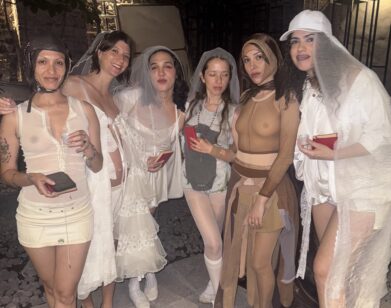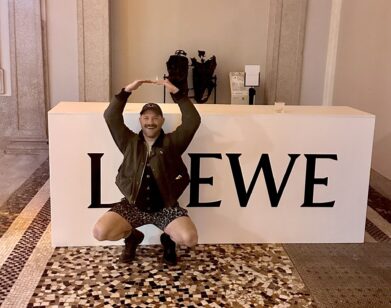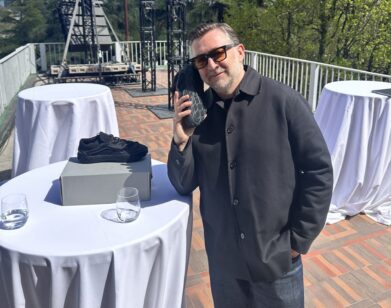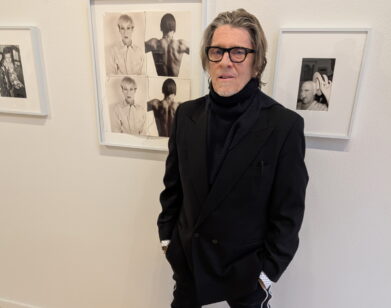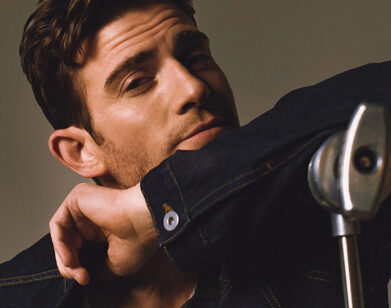Visions of Dale Peck
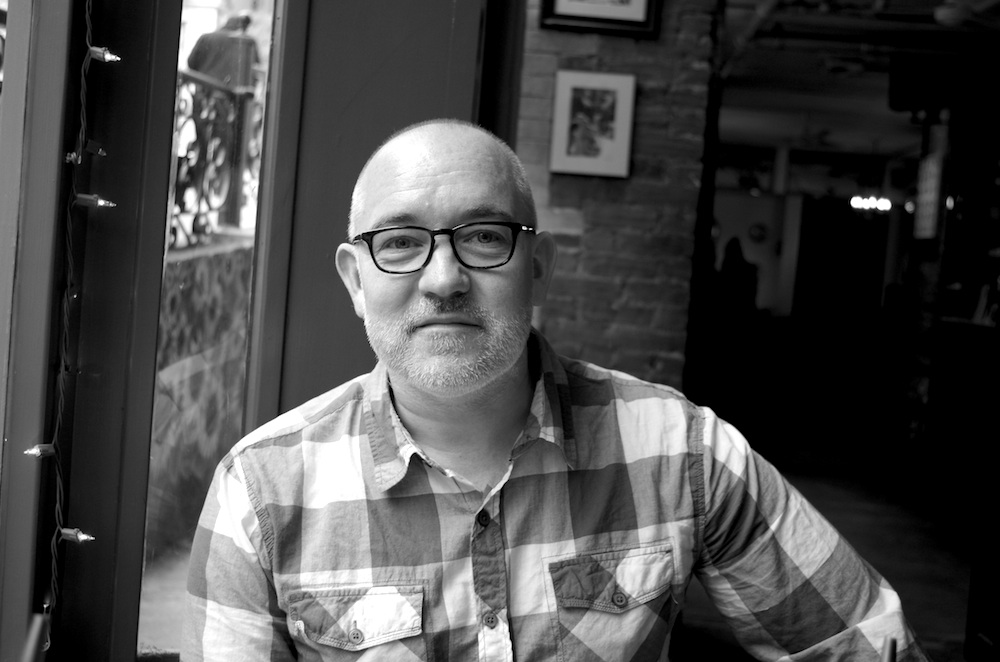
ABOVE: DALE PECK IN NEW YORK, APRIL 2015.
New York-based writer and New School professor Dale Peck was once lauded as “one of the most eloquent voices of his generation” by The New York Times. He’s also been called the “hatchet man” due to the often negative reviews he wrote as a literary critic for various publications (and which he subsequently compiled into his 2004 book, Hatchet Jobs: Cutting Through Contemporary Literature).
Born in Long Island and raised in Kansas, Peck attended Drew University in New Jersey before completing his MFA at Columbia in the late 1980s. It was while at Columbia that Peck wrote the beginning of his first novel, Martin And John, a classic of AIDS literature. He has always been iconoclastic and his books are both compelling and unsettling. In person, however, Peck is affable with a good sense of humor. While he once wrote in a New Republic review that Rick Moody was “the worst writer of his generation,” six years later he rather generously allowed Moody to throw a cream pie in his face at a writer’s benefit.
Earlier this month, Soho Press published Peck’s 12th book, Visions and Revisions: Coming of Age In the Age of Aids. In this personal account of the AIDS crisis between 1987 and 1996, Peck describes his involvement in the activist group ACT UP and documents the serial killers who emerged during the era targeting homosexual men.
GERRY VISCO: So, Dale, when did you come up with the idea for this book?
DALE PECK: Two and a half years ago. I’ve always wanted to write something about that period, but I thought I would write a big, important book—a history. I realized I was never ever going to do it. A couple of things happened. One, I was watching David France’s How To Survive a Plague, which made me think of a lot of the stuff, and then I was meeting with a student and I was talking about the movie and ACT UP, and he said, “What’s ACT UP?” He was 23 years old.
VISCO: Does ACT UP still exist?
PECK: Technically, yes. I think they do very quiet things. I worked with ACT UP from 1990 to 1993. I joined ACT UP the day after the “Stop the Church” action at the end of 1989. ACT UP started in 1987. The book starts in 1987 and goes to 1996.
VISCO: When did your plans for the book change from a conventional, third person history?
PECK: I went back and looked at what I’d written over the years in my files and I realized that I’d written quite a bit. I’d done some reported pieces and various essays over the years. About 70 percent of Visions and Revisions was previously written and published in The Village Voice, New York Magazine, London Review, and a lot was in Out. I cut them up into pieces. It’s episodic, non-chronological. I thought that rather than write an authoritative history of AIDS, I would just write about personal experience and create a book that was my experience of these particular years of the epidemic.
VISCO: Does that make it more vital?
PECK: It makes it more personal. AIDS was one of those diseases that a lot of people tried to claim ownership over, and especially as someone who was, fortunately never HIV positive, I wanted to avoid any appearance of doing that.
VISCO: How did you avoid it?
PECK: Partly because I came out very late. I came out after safe sex was invented and I always practiced safe sex. Except for when I lost my virginity.
VISCO: How old were you?
PECK: I was 20.
VISCO: Wow! What a weirdo! Was losing your virginity fun or boring?
PECK: Losing my virginity was very boring.
VISCO: Why? Was it the person you chose?
PECK: It was my best friend, about whom I had no sexual or romantic feelings whatsoever—never in a million years.
VISCO: So you did it as a sort of experiment?
PECK: He was polysexual. He would have sex with anyone.
VISCO: Would you say you were a late bloomer because you were shy?
PECK: No, it was because I was scared. I grew up in Kansas where it was very homophobic. My family was very homophobic, especially my father. It was the early 1980s—people still beat the shit out of you for being gay. When I was 15 I took a trip across the country by myself on a bus, and this guy tried to pick me up in Chicago. It was a black man in his 50s, and before high school I was in a very segregated environment, my family had no black friends, and was not particularly fond of white people either. So it brought up a lot of things. It was a kind of fabulous, surreal experience because it was midnight in Chicago and I’m this 15-year-old country boy and it was the opening night of Jaws 3-D, so everyone’s walking around in 3-D glasses in downtown Chicago, and this guy approaches me, old enough to be my grandfather, and he asks me to go for a walk with him in the park, and I’m like, “No thank you.” So he sits and keeps talking to me and then I go inside and he follows me inside. I’m playing video games and he’s standing nearby, pretending to play video games, but he hasn’t put any money in. It took me the longest time to figure out what it was he actually wanted. He seemed very benign, which is why I kept talking to him. It wasn’t until I realized that he wanted to have sex with me that I was creeped out.
VISCO: When did you realize you were gay? Was it an important moment or gradual?
Peck: I think by that point I was already fighting it. I had such a negative reaction to it after the fact.
Visco: Did you ever have sex with a girl?
PECK: I tried, after I came out.
VISCO: Any good?
PECK: No. She was bisexual. She famously had a tongue so long she could stick it out, touch her nose, curl it back and put two fingers through it. She was like Gene Simmons. French kissing her was like giving someone a blowjob. I used to make out with her all the time. But I was just not into it. I liked her as a person; I was just too uptight.
VISCO: How long have you been married to Lou?
PECK: Six years. It’s so hetero-normative of us. We met online eight and a half years ago.
VISCO: Did you ever expect to get married?
PECK: I always hoped that I would settle down with someone. Marriage, I could really give two shits about, as an institution, but it makes things easier. We wanted to be married and that was the most compelling reason in its favor. It handles things like inheritance and health insurance. But I think it’s a terrible institution and we should just abolish it for everybody. Who cares what the state thinks about your relationship? They’re giving you tax breaks and this and that—it’s just nonsense. You want to live with somebody, then live with somebody. All that other stuff is just a way for the state monitoring and codifying certain activities and ostracizing others.
VISCO: Did you feel you had to write this book because young people were not aware of what it was like during that time?
PECK: It was a combination of thinking young people had forgotten or had never been told what was going on. For people my age, it had been such a monumental experience. I never realized the degree to which it shaped my perceptions and who I am. Nothing has ever been as important to me as those years. Your life could be taken from you at any moment. Between AIDS and the violence against gay people that was so prevalent back then, you really didn’t feel like you were living in the United States of America, in a first world country. You had a sense that life was a precious commodity you had to fight to keep.
VISCO: So the book is about AIDS and mortality, but also these homophobic serial killers. Were they all over the country or just certain areas?
PECK: There were just a few at a certain moment. There was Jeffrey Dahmer in Milwaukee, and Richard Rogers in New York. But I was also living in England at the time for about two years, and there was this guy Colin Ireland who was active at exactly the same time as Richard Rogers was. Because gay people were so much more visible, violence against gays was more common and reported on. But they were definitely related to each other. In the wake of AIDS, gay people felt like they had to organize, become much more active and visible. AIDS fostered a gay rights movement that made gay people more powerful and more vulnerable at the same time.
VISCO: When you were involved in ACT UP, what were some of the things you did? Anything fun?
PECK: ACT UP was always fun. It was a very joyful group to be a part of. I was going to meetings, making posters; I did a lot of stuff with needle exchange, making bleach kits and distributing clean needles. I did three really big demonstrations, and lots of small demos. I did the NIH demo, the Kennebunkport demo. Probably the biggest thing I did was when, in 1991, ACT UP stormed the sets of all the major news networks. My group was the one that went to CBS Evening News with Dan Rather and we were the only one that actually got on the air.
VISCO: Did ACT UP only focus on AIDS activism or did it focus on other things like gay rights?
PECK: It depends on whom you talk to. It was formed to fight the AIDS crisis, but it understood that the AIDS crisis in this country was fundamentally a problem of homophobia, as well as racism, and a fear of nonconformity. The broad focus was always AIDS, but as ACT UP got more powerful some people pushed for a broader political agenda, and others argued that this diffused the organizations energies too much.
VISCO: What did you think?
PECK: ACT UP did a good job of skirting a happy medium for a long time. ACT UP’s tactics always revolved around political theater, its effectiveness depended on the media’s willingness to play along, to be outraged or shocked or whatever.
VISCO: In terms of HIV and AIDS, you feel the government was remiss then. What about the government today? Has it changed?
PECK: I’m not up on the current statistics and everything. There are still very big issues with continuing high rates of infections in gay men. A lot of that has to do with that so many gay men are infected that it’s just that much easier if you mess up, to be infected, and a sense that young gay kids just think that it’s a problem of an older generation and they don’t have to worry about it.
VISCO: But politically, back in the day, obviously it was a question of the Mayor and the President being reluctant to do anything.
PECK: They didn’t want to talk about it. I don’t think Reagan mentioned the word AIDS until 1986. And then, it was only because Nancy’s hairdresser was gay. The White House press secretary at the time was asked questions about AIDS and started making jokes. That was the attitude then—it’s only affecting gay people so who gives a shit, which is fairly reprehensible.
VISCO: What else can you tell me about the book?
PECK: It’s a hybrid of styles. There’s book criticism and a little bit of philosophizing. There’s personal narrative, sometimes in a reportorial manner, sometimes in a more charged, almost fictional manner. It swims around in styles and time. I was trying to give readers a sense of how unfixed everything was back then. Every day was like it’s own thing with no assumption of continuity and it was really exciting though often very terrifying. Looking back on it now, I realize that part of it had to do with the fact that I was so young.
VISCO: Did coming of age in the AIDS era ruin your idea of sexuality?
PECK: No. I think that if I’d been five years younger it would’ve been very different, but by the time I came to the city there was a very strong movement to reclaim sexuality from AIDS, not to equate sex with death and fear and those kinds of things. I was a big, big slut. I had lots of sex in lots of different places, like in parks, the Limelight. Especially when I lived in England where they insist on having sex outside, like in cemeteries and the Southbank Centre, a major theatrical complex there.
VISCO: What about AIDS nowadays?
PECK: It’s harder to get now because most people who are HIV positive are on drugs and that gets their viral load so low that it’s harder to transmit it. Most new infections come from people who don’t know they’re infected. I think there are a lot of people who think that it’s not terribly serious and there are other people who think well now I can take PEP—Post Exposure Prophylaxis.
VISCO: What about being gay in 2015?
PECK: We had the fun of being outlaws. But there’s a whole generation now coming up with new gender identities. For this generation of kids who don’t think that being gay is anything special, they might be more interesting than any of us. It’s nice to have something you think separates you from the mainstream and gives you perspective on that, but it can become very limiting at the same time if it’s something you use to artificially define yourself.
VISCO: Are you still doing literary criticism or not so much anymore?
PECK: I just did a piece for Bookforum. It was on a book of nonfiction. I’m actually going to start writing cultural and political commentary for The Observer, not criticism. It will become a monthly column.
VISCO: Are you working on a book right now?
PECK: I’m working on three books. I sold Visions and Revisions, along with another novel idea to Soho Press. So officially I’m working on this book that’s a prequel to Don Quixote.
VISCO: You mean the classic Cervantes?
PECK: Don Quixote starts when he’s 55 years old, so I’m writing about his childhood. Young Don Quixote is the exciting title. I have 80 to 100 pages of it. Then I’m working on a cycle of short stories. Do you know Suetonius’ The 12 Caesars?
VISCO: The Roman historian? He was like a gossip columnist.
PECK: The Kitty Kelley of his day. Inspired by that. I’m writing a book of short stories called 12 Caesars. Each short story is an analog to the stories in Suetonius’ book. I’m working on a seven-book series. Martin and John is the first.
VISCO: Seven book series? What’s the linking factor?
PECK: This character John. He’s my doppelgänger.
VISCO: Is he a pain in the ass too?
PECK: He’s a pain in the ass, a little too in love with his own misery—the pain the world has inflicted on him. A martyr. John always reminds me not to be a martyr. I changed a lot after I went to college. Before that I was shy and scared all the time. Drew University in New Jersey was the best thing that ever happened to me.
VISCO: Have you always been a writer?
PECK: In high school I was a speaker. I was going to be a lawyer. I did competitive debate. I went to college and was a political science major. One night I had a dream and woke up and wrote down the dream. That was my first short story. The dream was a kind of fantasy of me getting revenge on my father.
VISCO: Did you ever get revenge on him?
PECK: I think my first book or two. We had such fights. We’re much better now.
VISCO: Does he read you?
PECK: He doesn’t read the books but he reads about me a lot. He gets a kick out of the fact I’m famous in my circle but doesn’t like that I talk about him. My fourth novel, What We Lost is now being published under its real title Greenville. It was a vindication of him. He wanted to read it but it gave him too many nightmares, because it was about his childhood that was terrible.
VISCO: Do you have any advice for fledgling writers?
PECK: Don’t come to New York until you’ve finished a book. It’s too expensive. You’ll never write anything. You’ll spend all your time working to pay the rent. Obviously the industry is centered here and a lot can happen for you if you go to the right parties and meet the right people. When I moved here, I paid 350 in rent. I could go out and party and temp for three months, then take three months off and get stuff done. You can’t do that anymore because it’s too expensive. Write your book somewhere else. MFA programs can be constricting from an educational point of view, but they are great networking tools. If you go there and you’re good your teachers will notice it and will help you.
VISCO: Why have you been called the hatchet man?
PECK: I’m pretty sure I came up with that, because most contemporary fiction sucks. It’s intellectually dishonest, often morally dishonest. It’s cheap and easy. It pretends to be deep but is really quite shallow.
VISCO: Is it possible that writing fiction is stupid in itself?
PECK: It is for most people. Writing fiction is fundamentally an irrational act.
VISCO: Should more people read fiction?
PECK: No, they should read fiction only if it compels them to read it. I’m a novelist. I think fiction is important or I wouldn’t be doing it, but most of it’s bad. Art is only great if it’s uncodifiable. If art isn’t scaring you, if it’s not making you upset, then I don’t think it’s actually doing anything.
VISCO: So no more book reviews?
PECK: No plans. I’ve said all the bad things I need to say. I wrote Hatchet Jobs to work out my own ideas, not to dump on my peers.
VISCO: What current fiction writers do you like?
PECK: Big fan of Calvin Baker, who is a friend of mine, but he became a friend after his writing. Kathryn Davis. She’s about 65. She’s a huge genius. Her most recent novel is Duplex. She’s one of the most distinctly original voices out there. What all these weird meta-fictionists are trying to do she does a million times better. I thought Roberto Bolaño was great, but he’s dead now. I’m still looking for that younger writer to really excite me.
VISIONS AND REVISIONS: COMING OF AGE IN THE AGE OF AIDS IS OUT NOW. DALE PECK WILL APPEAR AT THE RAINBOW BOOK FAIR TOMORROW, APRIL 18.


